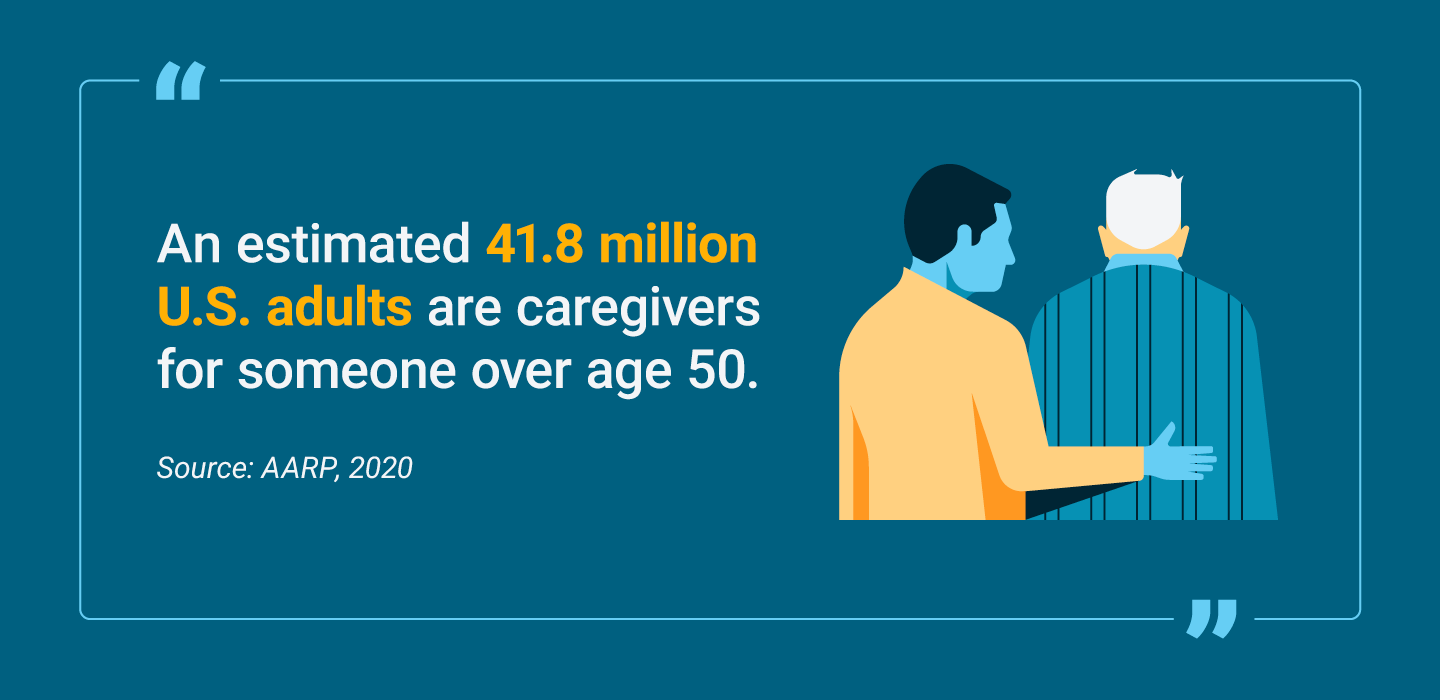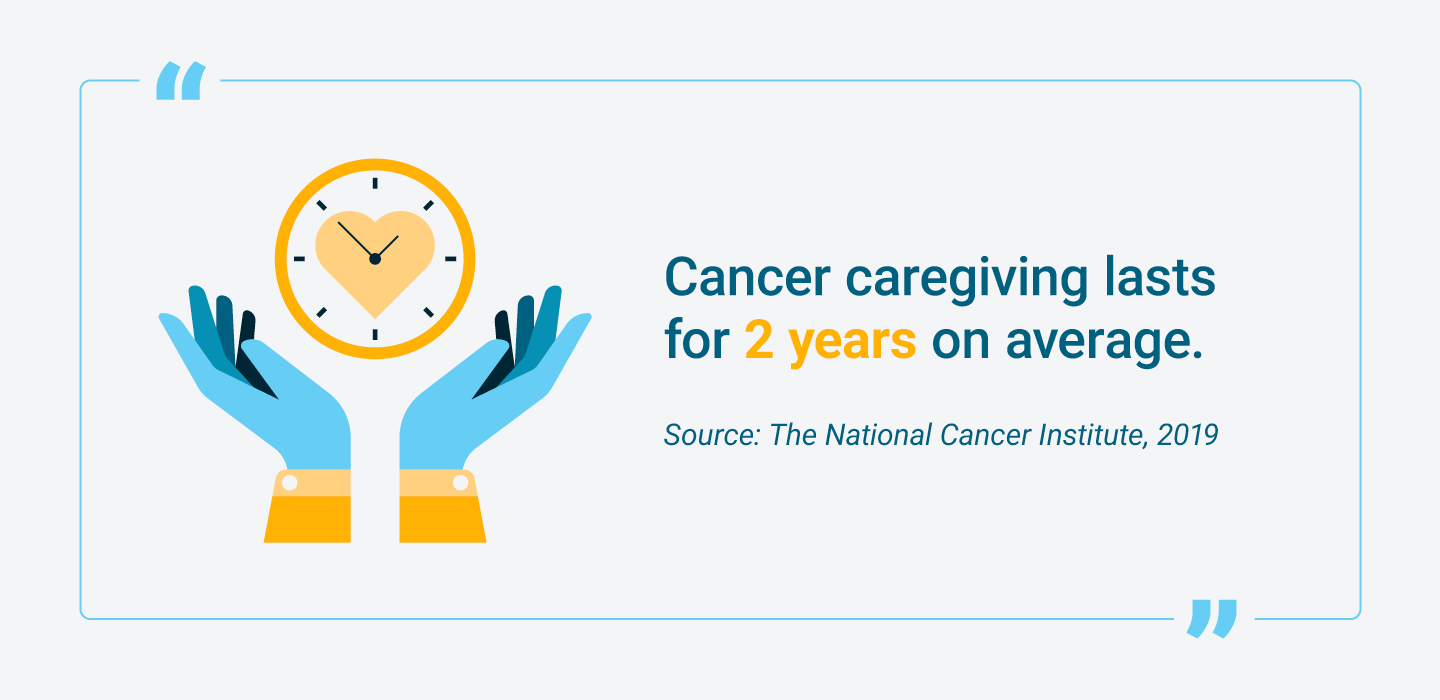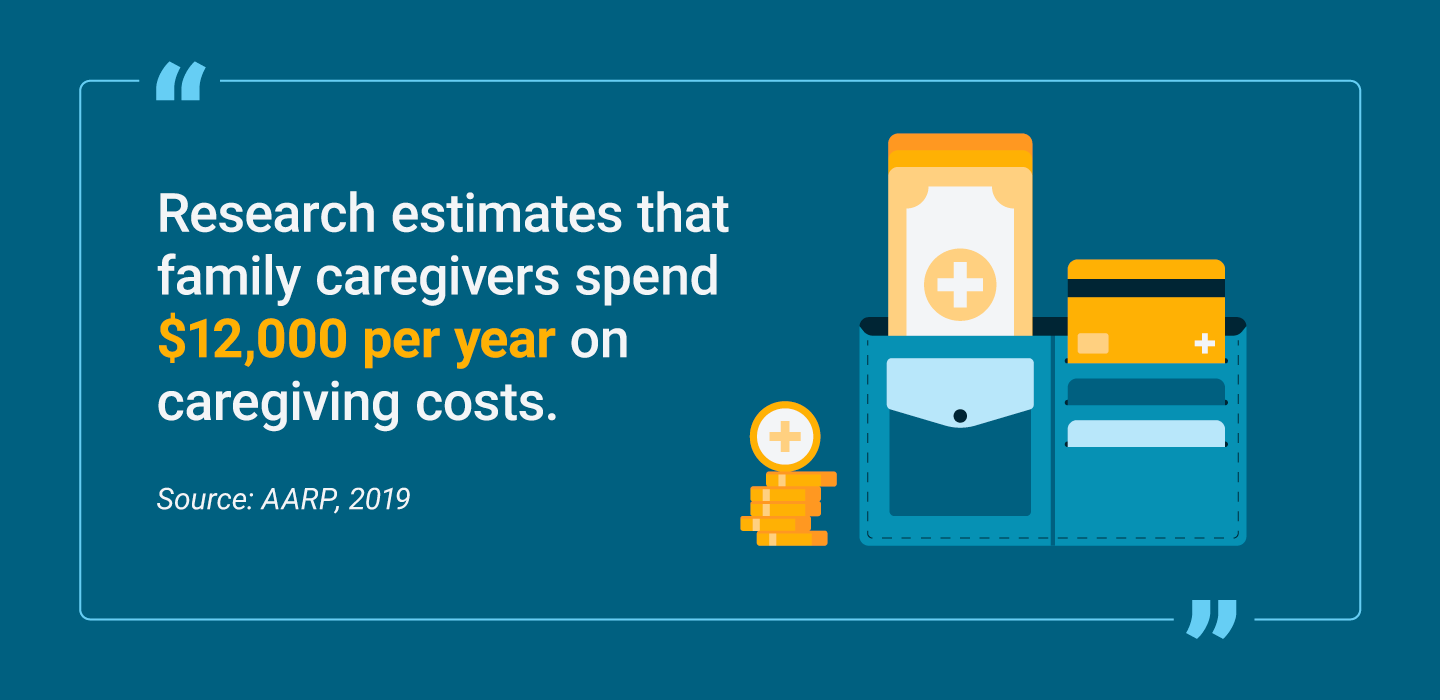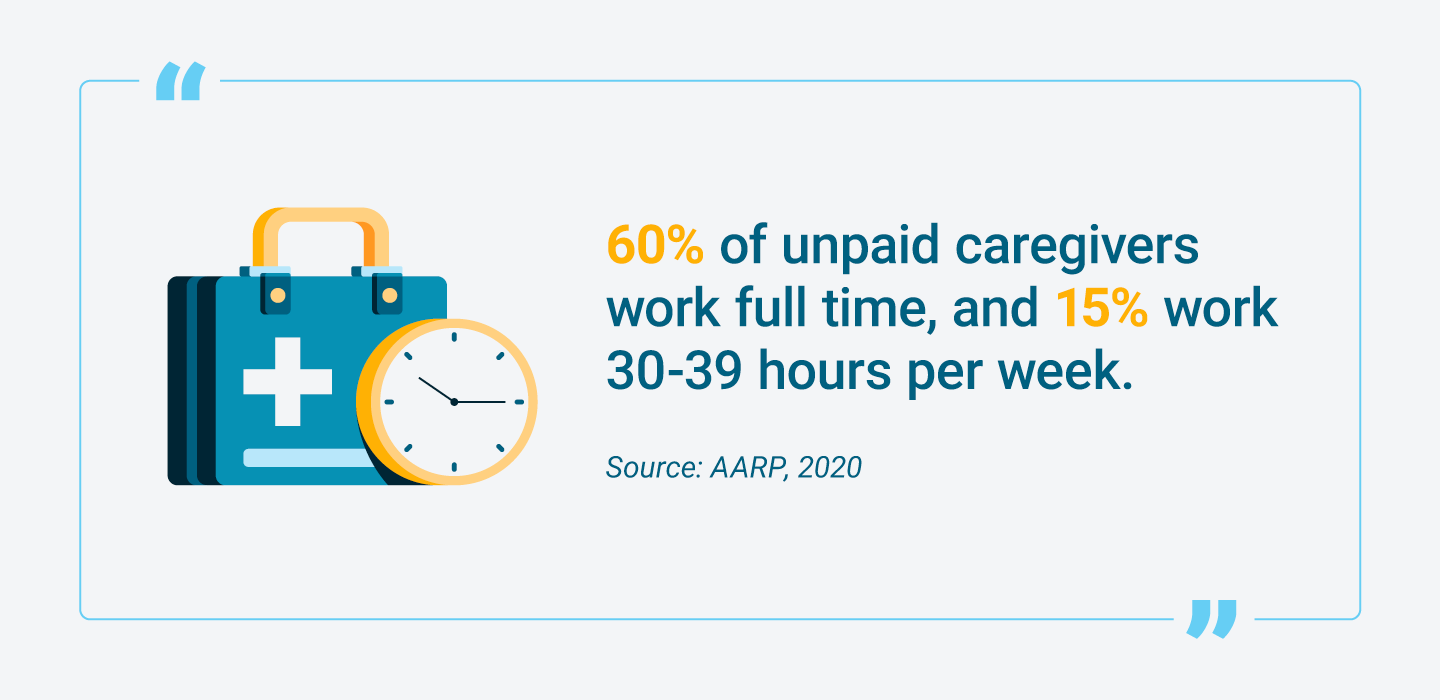Your Guide to Family Caregiver Benefits and Support
Written by Karen Selby, RN

What Caregiver Benefits and Support Programs Are Available to Family Caregivers?
Caregiver benefits can help ease the financial burden of care. The following are resources that directly help family caregivers, as well as senior programs that can help pay for senior care. By easing the cost of care, these programs help remove the strain put on the caregiver.
Federal Caregiver Assistance Programs
These national programs are available to seniors and caregivers nationwide.
BenefitsCheckUp
BenefitsCheckUp, sponsored by the National Council on Aging, aims to connect seniors with programs that can help them pay for essentials such as medicine, health care, housing and food.
To apply, seniors or their caregivers need to fill out a questionnaire with qualifying information such as location and income. The program then matches seniors with eligible programs, and they can begin enrolling.
The assistance provided by the BenefitsCheckUp program can help pay for food and housing, taking that financial strain off the caregiver’s shoulders.
Caregiver Homes
The Caregiver Homes program aims to help caregivers by providing care oversight and a modest daily stipend for caregiving expenses. There are several eligibility requirements for the program, including needing assistance with essential tasks such as bathing or eating.
To be eligible for the Caregiver Homes program, the person receiving care must:
- Be eligible for Medicaid
- Have a 24-hour, live-in caregiver
- Need assistance with one or more essential tasks such as bathing, walking, dressing, toileting, eating, etc.
Child and Dependent Care Credit
Using the Child and Dependent Care Credit, caregivers can claim a stipend up to $3,000 for one person and $6,000 for two or more people under their care. Though the IRS doesn’t require the person you’re caring for to be a dependent, there are rules for eligibility for this credit.
For a family member to qualify for a Dependent Care Credit, you must:
- Have a spouse who was mentally incapable of self-care and lived with you for half the year
- Have an individual who was mentally incapable of self-care and lived with you for half the year and who either: was your dependent or could have been your dependent except they (a) received gross income of $4,300 or more; (b) filed a joint return; or (c) you or your spouse could have been claimed as a dependent on another taxpayer’s 2020 return
Credit for Other Dependents
A tax credit directly lowers your tax bill. People have long been able to claim biological children under 16 for a tax credit, but a 2017 law expanded this ability to include individuals related by blood, adoption or marriage. You can use this credit to claim up to $500.
There are several eligibility requirements for this credit, including:
Both you and the person you’re caring for must be a U.S. citizen or U.S. legal resident
You and the person you’re caring for must live together
You’re not listed as a dependent on anyone else’s taxes
The person you’re caring for must not exceed $4,200 in yearly income
The Family Caregiver Alliance
Founded in 1977, The Family Caregiver Alliance aims to provide emotional and educational support to long-term family caregivers. On the FCA website, caregivers can access educational tools and webinars to help them learn more about caregiving and how to tackle tough situations. The alliance can also help connect caregivers to online support groups and financial support resources.
Long-Term Care Insurance
If the person you’re caring for has a long-term care benefit life insurance policy, they can help pay for their care. By combining their life insurance policy with a long-term care policy or adding on
Meals on Wheels
Founded in the 1950s, Meals on Wheels delivers more than 221 million hot meals to seniors per year. Using the “find meals” tool on the website’s home page, you can sign up to have meals delivered to the person under your care, so you don’t have to worry about putting dinner on the table.
To qualify for Meals on Wheels delivery, the person receiving care must:
- Be 60 years or older (this may vary by location)
- Have diminished mobility
Medicaid Self-Directed
The Medicaid Self-Directed program allows seniors to take charge of their care, including who cares for them. Some states using this program allow seniors to hire their own family members to provide their care. Eligibility for these services varies from state to state, as do coverage amounts and reimbursement rates.
U.S. Department of Veterans Affairs Caregiver Support
Those caring for injured veterans may be eligible to receive financial assistance through the U.S. Department of Veterans Affairs. The caregiver and veteran receiving care must apply together, so the department can determine eligibility.
Those who are eligible will receive a monthly stipend from the department. In addition, the VA offers legal and financial services for caregivers and veterans.
VA Aid and Attendance and Housebound Allowance
Qualified veterans may be eligible for additional funds per month, in addition to their pension. You can use these funds to help cover medical costs or costs of caregiving.
To be eligible for Aid and Attendance, the person receiving care must:
- Receive a VA pension
- Meet one of the following requirements:
- Need help with an essential activity such as eating, bathing or walking
- Stay in bed all day because of illness
- Be a patient in a nursing home
- Have restricted eyesight
To be eligible for Housebound Allowance, the person receiving care must:
- Receive a VA pension
- Spend most of their time at home because of a permanent disability
Veteran-Directed Care
Veteran-Directed Care through the U.S. Department of Veterans Affairs aims to help veterans receive aid and community-based services that can help them live independently in their communities. This includes a monthly stipend that can help the veteran hire a family member to provide care.
All veterans are eligible for Veteran-Directed Care if they:
- Are eligible for community-based care
- Meet the clinical criteria for the service
Requirements vary by location, so it’s best to check with your local VA.
How to Find Local Caregiver Assistance Programs
Since benefits and eligibility requirements often vary from state to state, there are many local resources available to help caregivers find the help they need.
The AARP Local Assistance Directory can help connect caregivers to reduced cost services in their area. The directory includes services such as food, medical care and job training. You can search for a specific service in your area, or simply input your zip code to pull up a list of all services available in or near your area.
The Family Care Navigator from the Family Caregiver Alliance can also help caregivers find programs and resources in their area.

Cancer Caregiving Resources
An estimated 2.8 million people provide care to a loved one with cancer. With so many people providing this emotional and challenging care, there are many resources available to help the patient and caregiver navigate a cancer diagnosis and treatment cycle.
The National Cancer Institute Caring for the Caregiver packet includes tips, advice and support for cancer caregivers. The American Cancer Society also provides caregiver resources and videos to help cancer caregivers emotionally and mentally during the caregiving process.
There are also financial aid programs for cancer patients that can help ease the financial burden on everything from housing to food.
For mesothelioma patients, the Cancer Care Financial Assistance Program helps those navigating a mesothelioma diagnosis with transportation and lodging costs.

How to Become a Paid Caregiver for a Family Member
It’s estimated that family caregivers spend $12,000 of their own money per year on caregiving costs. Applying for benefits and programs like the ones listed above can help take some of this cost away. These programs vary by state and have their own eligibility requirements, so it’s best to check with local chapters of senior aid groups, such as Medicare, to get started.
Some steps to becoming a family caregiver:
- Determine your eligibility for Medicare and Medicaid in your area.
- Find local community-based services.
- If your loved one is a veteran, enroll in veterans aid programs.
- Check your loved one’s life insurance for long-term care policies or advanced death benefits.
- Ask your job for paid leave benefits or remote work options.
- Communicate with your family about support.
If you’re eligible for financial benefits, you can use them to help ease the financial burden of medical and life costs or as payment for caregiving. From there, you can discuss options with your job and family members for additional support.

Other Options for Family Caregivers
Being a family caregiver comes with many challenges. Reaching out to loved ones and employers can help.
Family Support
Communicating your care needs with your loved ones can help ease your emotional burden. Ask your loved ones for assistance when you need it. If necessary, you can also ask your family members to support the caregiving efforts financially.
For mesothelioma caregivers, patients and families, there are also support groups that can help provide emotional support.
Paid Family Leave
Paid Family Leave programs vary from state to state and by employer, but your job may provide paid time off for caregiving purposes. If you are having difficulty navigating caregiving and work, asking your job for time off can help you make a plan and get on track.
Remote Work
Your company may also allow you to work from home while you are caregiving, allowing you to keep performing your job, tending to caregiving tasks and supporting your loved one.
Respite Care
Although respite care doesn’t directly provide financial benefits to a family caregiver, it can allow them some much-needed time off. In-home care agencies can come to your home and provide care, while adult day care programs are places seniors can go while their caregivers work, run errands or relax.
Caregiving can be long, hard and confusing. But there are options available. In addition to national and local programs that can help you, your doctors and care team are there to answer any questions you may have.






